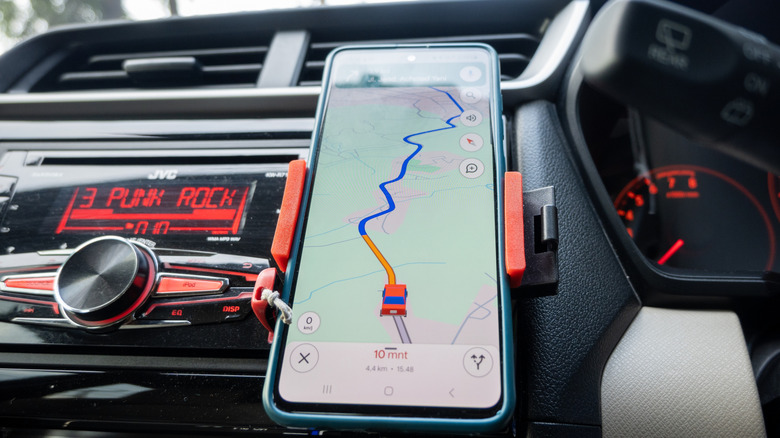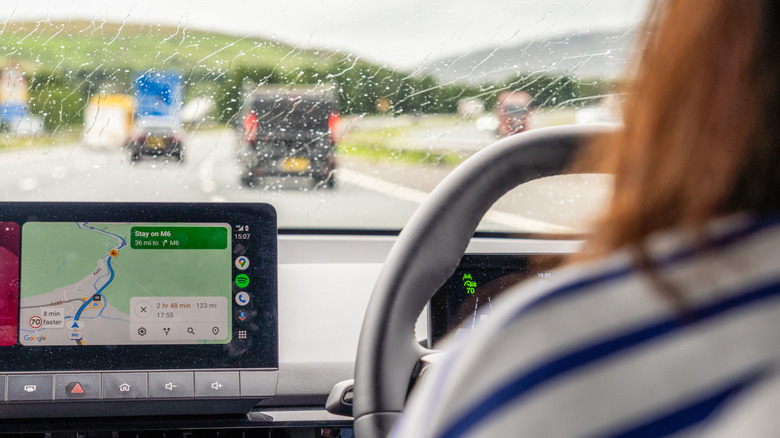Google Maps Will Remember The Name Of That Amazing Coffee Shop You Can't Recall
We've all been there: We found a great store, restaurant, or coffee shop by accident, and we forgot what it's called. Having enjoyed it, we want to revisit it or recommend it to a friend, but it's difficult to do it without recalling the name. You can always look up the neighborhood with a navigation app like Google Maps and use Street View to find your way. But what if Google Maps already remembered the name of the place you visited? A recent discovery in the code of Google Maps for Android indicates that Google is working on a new feature called "Your recent places."
According to Android Authority, the new "Your recent places" section appears in the "You" tab in Google Maps version 25.34.00.796159725. Specifically, the new menu sits above the "Your lists" section. As usual with findings in the code of Android applications, there's no telling when Google will release the functionality, but the code shows the company is actively developing the functionality.
Interestingly, Apple showed a similar feature for Apple Maps when it unveiled iOS 26 at WWDC 2026. It's called "Visited Places," and if enabled, the feature will allow Apple Maps to automatically remember places of interest. Like the newly found Google Maps feature, Apple Maps will identify restaurants, parks, and other locations so you don't have to remember the name.
How to find Your recent places in Google Maps
The "You" tab in Google Maps is the menu where you'd find the places of interest you might have saved. The "Your lists" section will help you manage favorite lists, "Saved trips," and lists from friends. Images that Android Authority produced show that the "Your recent places" menu will appear in the "You" tab, getting a prominent central placement so you can quickly find the location whose name you can't recall.
The new menu has filters at the top that should help you narrow down the search. The "Area," "Category," "Saved," and "Maps history" menus should help you find that location faster than scrolling a long list of places. "Your recent places" will also show a scrollable list of locations you've visited, each featuring a name and a thumbnail picture. You can also tap a three-dot menu for more information, share that place, and remove it from your history.
All that said, the feature will not be available in the Google Maps version you're using on Android and iPhone until Google releases it officially. Android Authority made it work only after digging through the app's code.
What about user privacy?
It's unclear how Google Maps detects the places you've been to. Apple claimed in June that "Visited Places" will work automatically. "You can choose to have your iPhone detect when you're somewhere, like a restaurant or shop, and then view your Visited Places in the Maps library," Apple explained during the Apple Maps segment. The feature will also let you share Apple Maps places with friends and delete saved places. The data is protected with end-to-end encryption.
Google Maps might employ a similar auto-detection process to identify visited places. As for the privacy of Google Maps, it's worth remembering that Google Maps history is now stored on-device rather than in the cloud, and it's accessible only to the user. "Your recent places" will probably store the location of your recently visited places on your handset, but that's speculation for now.
The "Your recent places" feature could also work well with personalized AI experiences. For example, Google recently announced that Gemini Live will work with more Google apps and include additional Google Maps integration. A feature like "Your recent places" would work well with Gemini Live in scenarios where you're using the AI assistant to text a friend about a newly discovered place and you can't remember the name. The AI might surface that information from Google Maps. Again, this is speculation.
Google will explain how the "recent places" feature works once it becomes available. Considering that Apple will launch Visited Places in Apple Maps in iOS 26, it's likely that Google will want to have a matching experience for its Google Maps product.


